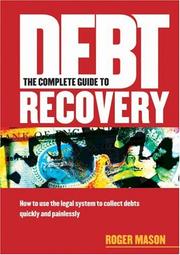| Listing 1 - 10 of 120 | << page >> |
Sort by
|
Book
Abstract | Keywords | Export | Availability | Bookmark
 Loading...
Loading...Choose an application
- Reference Manager
- EndNote
- RefWorks (Direct export to RefWorks)
Debt relief --- -Debt relief --- Debt renegotiation --- Debt rescheduling --- Debt restructuring --- Relief, Debt --- Renegotiation, Debt --- Rescheduling, Debt --- Restructuring, Debt --- Debtor and creditor --- Law and legislation
Book
ISBN: 1642593826 Year: 2020 Publisher: Chicago, Illinois : Haymarket Books,
Abstract | Keywords | Export | Availability | Bookmark
 Loading...
Loading...Choose an application
- Reference Manager
- EndNote
- RefWorks (Direct export to RefWorks)
"Debtors have been mocked, scolded, and lied to for decades. We have been told that it is perfectly normal to go into debt to get medical care, to go to school, or even to pay for our own incarceration. We've been told there is no way to change an economy that pushes the majority of people into debt while a small minority hoards wealth and power. Debtors of the world must unite. As isolated individuals, debtors have little influence. But as a bloc, we can leverage our debts and devise new tactics to challenge the corporate creditor class and help win reparative, universal public goods. Individually, our debts overwhelm us. But together, our debts can make us powerful"--
Debt relief. --- Debt relief --- Debt renegotiation --- Debt rescheduling --- Debt restructuring --- Relief, Debt --- Renegotiation, Debt --- Rescheduling, Debt --- Restructuring, Debt --- Debtor and creditor --- Law and legislation

ISBN: 3486575805 3486707620 Year: 2011 Publisher: De Gruyter
Abstract | Keywords | Export | Availability | Bookmark
 Loading...
Loading...Choose an application
- Reference Manager
- EndNote
- RefWorks (Direct export to RefWorks)
Das am 27. Februar 1953 unterzeichnete Londoner Schuldenabkommen stellte ein Novum in der Geschichte der internationalen Schuldenregelung dar. Mit ihm wurde die gigantische deutsche Auslandsverschuldung des privaten und öffentlichen Sektors aus der Vor- und Nachkriegszeit geregelt. Als Rechtsnachfolgerin des Deutschen Reiches übernahm die Bundesrepublik die Haftung für die gesamten Vorkriegsschulden des ehemaligen Reichs. Die langwierigen und von zahlreichen Schwierigkeiten durchzogenen Verhandlungen erreichten, dass das Schuldenabkommen dem tatsächlichen Leistungsvermögen der Bundesrepublik angepasst wurde. Mit dem Londoner Schuldenabkommen wurde die Kreditwürdigkeit der jungen Bundesrepublik wiederhergestellt; es war damit eine Conditio sine qua non für die Wiedergewinnung der Souveränität der Bundesrepublik Deutschland.
Debt relief --- Debts, Public --- World War, 1939-1945 --- Reparations. --- Germany --- Economic conditions --- Reconstruction (1939-1951) --- Debt renegotiation --- Debt rescheduling --- Debt restructuring --- Relief, Debt --- Renegotiation, Debt --- Rescheduling, Debt --- Restructuring, Debt --- Debtor and creditor --- Economic aspects --- Law and legislation
Book
ISBN: 3835094378 3835005901 Year: 2007 Volume: Bd. 116 Publisher: Wiesbaden : Deutscher Universitats-Verlag,
Abstract | Keywords | Export | Availability | Bookmark
 Loading...
Loading...Choose an application
- Reference Manager
- EndNote
- RefWorks (Direct export to RefWorks)
The economic ramifications of corporate financial distress and bankruptcy have recently gained much attention in academic as well as public policy debates. But empirical evidence on how firms encounter and respond to distress has remained sparse and inconclusive. Philipp Jostarndt analyzes the anatomy of financial distress for a large sample of German corporations. He studies distress-induced changes in ownership and control, success factors in distressed equity infusions, and firms’ choice between in- and out-of-court debt restructurings. Moreover, he conducts a survival analysis to examine the determinants of survival, acquisition, and bankruptcy as alternative paths to exit financial distress. He includes both the firm perspective as well as the market valuations of the undertaken restructurings and, where applicable, relates the findings to the microstructure of Germany’s revised bankruptcy legislation.
Debt relief. --- Financial crises --- Crashes, Financial --- Crises, Financial --- Financial crashes --- Financial panics --- Panics (Finance) --- Stock exchange crashes --- Stock market panics --- Crises --- Debt relief --- Debt renegotiation --- Debt rescheduling --- Debt restructuring --- Relief, Debt --- Renegotiation, Debt --- Rescheduling, Debt --- Restructuring, Debt --- Debtor and creditor --- Law and legislation --- Leadership. --- Finance. --- Business Strategy/Leadership. --- Finance, general. --- Funding --- Funds --- Economics --- Currency question --- Ability --- Command of troops --- Followership
Book
ISBN: 128008054X 9786610080540 9264096213 9264097023 Year: 2001 Publisher: Paris Cedex, France : OECD,
Abstract | Keywords | Export | Availability | Bookmark
 Loading...
Loading...Choose an application
- Reference Manager
- EndNote
- RefWorks (Direct export to RefWorks)
Governments are amongst the major issuers of debt instruments in the global financial market. The present volume provides quantitative information on central government debt instruments to meet the analytical requirements of users such as policy makers, debt management experts and market analysts. Statistics are presented according to a comprehensive standard framework to allow cross-country comparison. Country notes provide information on debt issuance in each country as well as on the institutional and regulatory framework governing debt management policy and selling techniques.
Debts, Public -- Europe -- Statistics -- Periodicals. --- Debts, Public -- OECD countries -- Statistics -- Periodicals. --- Debts, Public -- OECD countries -- Statistics. --- Debts, Public -- Statistics -- Periodicals. --- Debts, Public -- Statistics. --- Debt relief. --- Debt relief --- Debt renegotiation --- Debt rescheduling --- Debt restructuring --- Relief, Debt --- Renegotiation, Debt --- Rescheduling, Debt --- Restructuring, Debt --- Debtor and creditor --- Law and legislation
Book
ISBN: 9781107128019 1107128013 9781316422809 9781107567320 1107567327 1316566617 1316566277 1316566951 131656729X 1316568652 1316422801 1316564231 9781316568651 Year: 2016 Publisher: New York
Abstract | Keywords | Export | Availability | Bookmark
 Loading...
Loading...Choose an application
- Reference Manager
- EndNote
- RefWorks (Direct export to RefWorks)
According to the doctrine of odious debt, loans which are knowingly provided to subjugate or defraud the population of a debtor state are not legally binding against that state under international law. Breaking with widespread scepticism, this groundbreaking book reaffirms the original doctrine through a meticulous and definitive examination of state practice and legal history. It restates the doctrine by introducing a new classification of odious debts and defines 'odiousness' by reference to the current, much more determinate and litigated framework of existing public international law. Acknowledging that much of sovereign debt is now governed by the private law of New York and England, Jeff King explores how 'odious debts' in international law should also be regarded as contrary to public policy in private law. This book is essential reading for practising lawyers, scholars, and development and human rights workers.
Debts, External --- Debts, Public --- Debt relief. --- International law. --- Law of nations --- Nations, Law of --- Public international law --- Law --- Debt relief --- Debt renegotiation --- Debt rescheduling --- Debt restructuring --- Relief, Debt --- Renegotiation, Debt --- Rescheduling, Debt --- Restructuring, Debt --- Debtor and creditor --- Law and legislation. --- Law and legislation --- International law --- Odious debt.

ISBN: 1854182277 9786610233212 1423721276 1280233214 1854184245 9781854182272 9781854184245 9781423721277 Year: 2003 Publisher: London Thorogood
Abstract | Keywords | Export | Availability | Bookmark
 Loading...
Loading...Choose an application
- Reference Manager
- EndNote
- RefWorks (Direct export to RefWorks)
This work guides the reader through every stage of debt recovery, from deciding to take action to serving a claim and the trial itself. It deals comprehensively with enforcing judgement and features sections on bankruptcy, winding up receivership and administration.
Collecting of accounts - Great Britain. --- Debtor and creditor. --- Law - Non-U.S. --- Law, Politics & Government --- Law - Great Britain --- Debt relief. --- Debt relief --- Debt renegotiation --- Debt rescheduling --- Debt restructuring --- Relief, Debt --- Renegotiation, Debt --- Rescheduling, Debt --- Restructuring, Debt --- Creditor --- Debtor and creditor --- Law and legislation --- Commercial law --- Contracts --- Obligations (Law) --- Credit --- Creditors' bills --- Fraudulent conveyances --- Liens --- Payment --- Security (Law)

ISBN: 9789004162471 900416247X 9789047431428 9047431421 1281936855 9781281936851 9786611936853 6611936858 Year: 2007 Publisher: Leiden Boston Martinus Nijhoff Publishers
Abstract | Keywords | Export | Availability | Bookmark
 Loading...
Loading...Choose an application
- Reference Manager
- EndNote
- RefWorks (Direct export to RefWorks)
The insolvency of sovereign debtors is a virtually timeless phenomenon and yet the existing international financial architecture does not provide any legal framework to deal with this issue. Following an overview of the main proposals as to how to bridge this gap, this study analyses the extent to which public international law can be used as a source for the establishment of a reorganisation system for sovereign debt. While there is no adequate customary international law relating to sovereign insolvencies, reference can instead be made to the growing body of general principles of law. This is illustrated by a comparison of the systems of corporate financial reorganisation in insolvency in six representatively selected countries - Argentina, England, France, Germany, Indonesia and the U.S. Due to the inherent lack of enforceability with regard to sovereign debtors, in order to be able to provide a basis for a reorganisation system for sovereign debt, these principles need to be complemented with a compliance control mechanism. This study suggests how such a system could be constructed and implemented.
Debts, Public --- Debt relief. --- State bankruptcy. --- Finance, Public --- Dettes publiques --- Dettes --- Faillite d'Etat --- Finances publiques --- Law and legislation. --- Law and legislation --- Droit --- Allègement --- Debt relief --- State bankruptcy --- Bankruptcy, National --- National bankruptcy --- Bankruptcy --- International law --- Repudiation --- Debt renegotiation --- Debt rescheduling --- Debt restructuring --- Relief, Debt --- Renegotiation, Debt --- Rescheduling, Debt --- Restructuring, Debt --- Debtor and creditor

ISBN: 0511609280 0521352029 0521555523 Year: 1996 Publisher: Cambridge : Cambridge University Press,
Abstract | Keywords | Export | Availability | Bookmark
 Loading...
Loading...Choose an application
- Reference Manager
- EndNote
- RefWorks (Direct export to RefWorks)
International debt rescheduling, both in earlier epochs and our present one, has been marked by a flurry of bargaining. In this process, significant variation has emerged over time and across cases in the extent to which debtors have undertaken economic adjustment, banks or bondholders have written down debts, and creditor governments and international organizations have intervened in negotiations. Debt Games develops and applies a situational theory of bargaining to analyze the adjustment undertaken by debtors and the concessions provided by lenders in international debt rescheduling. This approach has two components: a focus on each actor's individual situation, defined by its political and economic bargaining resources, and a complementary focus on changes in their position. The model proves successful in accounting for bargaining outcomes in eighty-four percent of the sixty-one cases, which include all instances of Peruvian and Mexican debt rescheduling over the last one hundred and seventy years as well as Argentine and Brazilian rescheduling between 1982 and 1994.
Debt relief. --- Loans, Foreign. --- Debts, External. --- Debts, Foreign --- Debts, International --- External debts --- Foreign debts --- International debts --- Debt --- International finance --- Investments, Foreign --- Foreign loans --- International loans --- Loans, International --- Loans --- Conditionality (International relations) --- Foreign loan insurance --- Debt relief --- Debt renegotiation --- Debt rescheduling --- Debt restructuring --- Relief, Debt --- Renegotiation, Debt --- Rescheduling, Debt --- Restructuring, Debt --- Debtor and creditor --- Law and legislation --- Social Sciences --- Political Science
Book
ISBN: 1800081871 180008188X Year: 2022 Publisher: London : UCL Press,
Abstract | Keywords | Export | Availability | Bookmark
 Loading...
Loading...Choose an application
- Reference Manager
- EndNote
- RefWorks (Direct export to RefWorks)
In an era when many of us depend on debt to survive but struggle with its consequences, Financing Prosperity by Dealing with Debt draws together current thinking on how to solve debt crises and promote inclusive prosperity. By profiling existing action by credit unions and community organisations, alongside bold proposals for the future, with contributions from artists, activists and academics, the book shows how we can rethink the validity and inevitability of many contemporary forms of debt through organising debt audits, promoting debt cancellation and expanding member-owned co-operatives. The authors set out legal and political methods for changing the rules of the system to provide debt relief and reshape economies for more inclusive and sustainable flourishing. The book also profiles community-based actions that are changing the role of debt in economic, social and political life - among them, participatory art projects, radical advice networks and ways of financing feminist green transitions. While much of the research and activism documented here has taken place in London, the contributors show how different initiatives draw from and generate inspiration elsewhere, from debt audits across the global south, creative interventions around the UK and grassroots movements in North America. Financing Prosperity by Dealing with Debt moves beyond critique to present a wealth of concrete ways to tackle debt and forge the prosperous communities we want for the future.
Debt relief. --- Finance, Personal. --- Finance, Personal --- Financial management, Personal --- Financial planning, Personal --- Personal finance --- Personal financial management --- Personal financial planning --- Finance --- Financial literacy --- Debt relief --- Debt renegotiation --- Debt rescheduling --- Debt restructuring --- Relief, Debt --- Renegotiation, Debt --- Rescheduling, Debt --- Restructuring, Debt --- Debtor and creditor --- Planning --- Law and legislation
| Listing 1 - 10 of 120 | << page >> |
Sort by
|

 Search
Search Feedback
Feedback About UniCat
About UniCat  Help
Help News
News